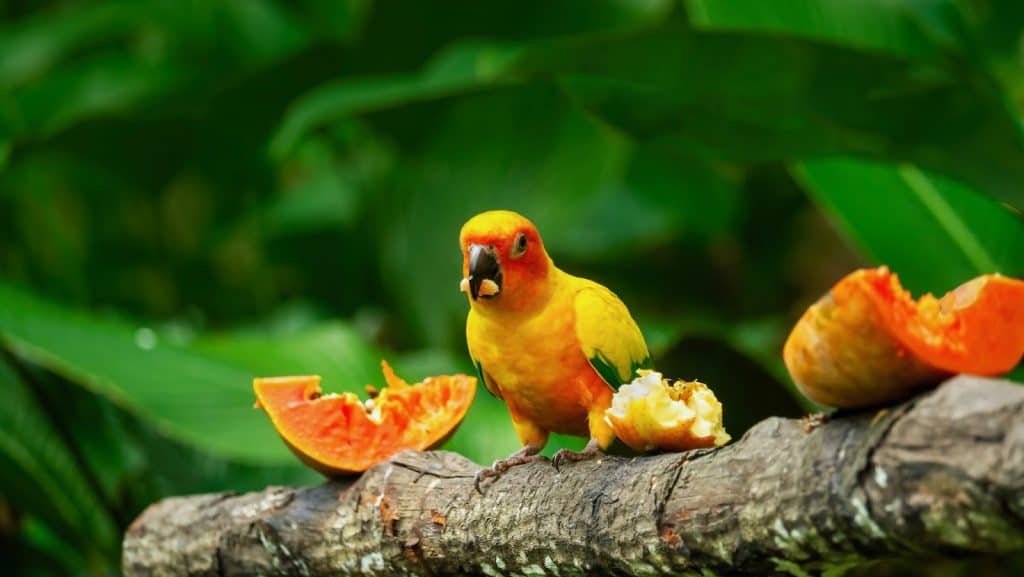We’ve all probably eaten a Watermelon. This heavy and juicy fruit has low calories, making it safe for eating, especially for those on a diet. It may even be one of your favorite fruits. But can you conure eat watermelon?
Conures can eat watermelons. A slice would benefit your pet’s organs, bones, and immune system and can be a great source of minerals and vitamins for your pet.
The Benefits Of Watermelon For Conures
Watermelon can be an enjoyable fruit for both conures and humans. It consists of nutrients that essentially help in creating a better immune system. Here are some of the benefits watermelon can give your conures.
Choline
Choline is a vitamin that can help your conure develop the proper muscles for better coordination and movement. This vitamin also helps the brain start alert and attentive.
Fiber
Watermelons have high fiber content, which aids in getting rid of toxins in the body. There’s also a substantial amount of good bacteria in a watermelon that targets the gut.
Giving your bird watermelons can help lower your pet’s chances of developing cancer, obesity, diabetes, and even cardiovascular diseases.
Vitamin A
This vitamin supports the keratin produced in a bird’s body, enabling them to grow healthy feathers. Enough keratin produce will make your bird’s feathers more smooth, vibrant in color, and healthy.
Amino Acid L-Citrulline
This acid helps develop a healthy heart and blood flow in the body. Studies show that this acid strengthens a Parrot’s heart and blood vessels.
The L-citrulline Acid also helps in developing muscles and preventing soreness and aches.
Vitamin C
Vitamin C can strengthen your conure’s immune system. It also adds to the care of your pet’s skin.
Lycopene
Watermelons have high anti-oxidant content, which is excellent for keeping the heart-healthy. Increased intake of Lycopene can also decrease the chances of developing cancer, stroke, and other serious health issues.
Phosphorus
This nutrient is essential to help develop stronger bones and beaks for your conure. It also helps produce cells and tissue to further build your parrot’s body.
Phosphorus intake can also positively affect your bird’s emotional well-being and energy levels.
Water
The last on our list would be water. At least 90% of watermelon is composed of water. Not only is this fruit a great snack, but a great way of allowing your pet to hydrate.
Water’s natural function is to help the body flush out toxins and waste. Enough water intake will allow your bird to live a healthy life.
Conures And Watermelon Rinds
Technically, birds can eat all parts of the watermelon, especially when your fruit is organically grown. But many Conure owners shy away from feeding their pets with watermelon rinds.
They want to protect their pets from pesticides that farmers may have sprayed on the fruit’s outer part.
Pesticides can linger on fruits even after it’s washed with running water. If ingested by Parrots, it can create worrisome health issues for your pets.
However, there can be exceptions made for feeding your pet watermelon rinds. If you are sure that the watermelon you have is organically grown, then feeding the rinds to your pet won’t be an issue.
It is imperative to have a background about who produces the food. Local produce tends to be fresher and healthier.
It Boosts Your Bird’s Energy
Watermelon rinds have significant amounts of citrulline. This chemical helps manage the blood pressure of your conure and nourishes the heart, boosting your pet’s energy levels.
Feeding birds with the right amount of watermelon rinds can equate to having fed them the usual source of protein like the actual fruit and seeds in their diet.
The fiber content of watermelon rinds helps support the optimal growth performance of birds. It is also a great source of fiber which can help you maintain healthy food and blood flow in your pet’s body. (Source)
Can Conures Eat Watermelon Seeds?
Parrots feed on a wide variety of food. It is evident, especially for those that live in the wild. Large parrot types like Golden Conures can eat Croton plant beans that are more sizeable than other seeds. (Source)
This bird specie can eat almost anything from soft fruits and vegetables to hard items like nutshells and seeds. Yes, conures can eat watermelon seeds. The seeds are the first parts of the watermelon they go. Some seeds have outer coatings that may be harder to break.
Eating seeds can enrich the strength of your conure’s jaw and beak. These birds have powerful beaks for this purpose. It is why you don’t have to worry about watermelon seeds harming your pet.
Like other edible seeds, watermelon seeds contain nutrients. Watermelon seeds are a great source of magnesium, potassium, folate, zinc, and copper. Many of these nutrients significantly benefit your bird-like bone growth and heart health. Watermelon seeds also help establish a better metabolism for your conure’s digestive system.
Can Green Cheek Conures Eat Watermelon?
One of the most necessary things to remember when caring for a pet is to know how to feed it with a proper diet. It may even be the most common concern for pet owners.
If you’re asking if your Green Cheek Conures can eat watermelon, then the answer is yes. You can easily feed most parrots with fresh produce, whether fruits or vegetables. Birds may even find watermelons to be appealing because of their sweet taste.
The typical behavior observed in parrots eating watermelon is that they usually go for the seeds before the other parts of the fruit. One practical reason is that eating seeds allows your pet Parrots to exercise their beaks. It is why it’s highly beneficial for you to always include hard food items in your pet’s diet. Eating seeds and nuts allows them to exercise beak and jaw strength.
Other known diets for Green Cheek Conures are a mixture of various seeds, fruits, and vegetables available in local markets. Some of these sprouted seeds are sunflower, safflower, and parakeet mixes. (Source)
This parrot also eats the typical apple, orange, corn, carrots, beets, and spinach.
What Fruits Can Conures Not Eat?
Despite the wide range of food available for Parrots in the wild and in domestic places, there are still food items you must keep away from them at all times.
Conures cannot eat avocadoes. Despite being a fruit, this particular food item contains persin. Persin is a fatty substance that can cause severe heart damage to a bird.
Because a persin’s high-fat content can become a source of respiratory problems and muscle weakness, high avocado intake can also result in death in severe cases.
Apple and pear seeds have fruit pits that serve as a lining between the seed and the fruit itself. You should not feed this lining or fruit pit to birds. Cherries, Peaches, and Plums are other fruits that also have fruit pits.
Fruit pits have small cardiac-toxic cyanide components that can be lethal for birds. But if you can remove these parts, any fruit should be safe for conures to eat.
Can Conures Have Melon?

Conures can eat a wide variety of fruits that including melon. It would be best to remember to provide your bird with at least three different fruits daily.
Doing this will help your bird expand its palette and not limit its preference to just one type of fruit. It’s better to introduce your bird to different fruits and vegetables now than to do it later.
A conure’s diet plays a significant role in preventing physical and psychogenic disorders for birds. Imbalance in these aspects can affect the physiological and emotional well-being of a bird. (Source)
The lack of a proper diet can also weaken the relationship of the conure with its owner and peers. Any discomfort threatens the ability of a bird to thrive and develop to its fullest potential.
Getting a picker eater to eat new food in their diet can be challenging. Other fruits that conures can eat are strawberries, bananas, grapefruits, oranges, apricots, and tangerines.
How To Serve Watermelon To Your Conures
Parrots living in the wild tend to have varying diets. Research shows that conure diets, when not monitored, can be heterogeneous and unbalanced. (Source). It may be a challenge for some conure keepers to introduce a well-balanced diet for their pets.
There are different ways how you can feed your conures with watermelons. If your pet is a picky eater, you can probably benefit from the following methods.
- Give Your Conure Big Pieces Of Watermelon
Giving your bird large chunks of watermelon will automatically try to break it down into smaller parts. Doing so will force them to eat small amounts of the fruit itself.
If you’re introducing watermelons to your conure, make sure that you try to feed them when it is most hungry. Interacting with your bird while providing it will make food introduction a smooth experience.
- Try Placing The Food In A Different Location
See your conure’s behavior if you set its food in another place. If you’ve been feeding your bird on the cage floor, try moving up its food to a different level in the cage.
This concept is the same as not feeding your pet with too much of one type of food. Allow your pet to associate different food with different experiences so they won’t become picky eaters.
Mix up your pet’s food from time to time. Give your conures treats and meals that can help their health. You can also feed your conure with a mixture of half-cooked fruits or vegetables.
The essential thing is to remember not to give anything too salty or sweet to your conure. Too many of these can bring your pet distress because of unbalanced chemical levels.
- Clean Up Their Cage
Cleaning your pet’s cage doesn’t only help your conure physically but also emotionally. When birds are in distress, they can resort to reducing food intake.
If you’re feeding fresh fruits and vegetables to your conures, make sure to clean the cage of it upon finishing.
Fresh products will spoil in just hours, so you must constantly clean the cage to ensure your pet doesn’t eat anything rotten.
Getting rid of anything that may clutter your conure’s cage can significantly affect your pet’s ability to eat well.
The Importance Of Fresh Watermelon
Feeding your conures with fresh fruits like watermelon will make it less likely for them to be overweight. Food with fewer preservatives is much healthier than those with such chemicals.
Birds have a very delicate digestive system and organs. You should prepare them an organically produced diet as much as possible.
If you care for a conure, buying fresh produce is the way to go. Parrots naturally found in the wild can feed on almost any fruit, seed, or vegetable. It’s essential not to underestimate your pet’s eating habits.
You can find fresh watermelon in local farmer’s markets. Buying from direct farmers will ensure that the food you’re buying does not undergo any complex processes that involve the use of harmful chemicals.
- Otu, BO, Banjo, A.A., Kolo, P.S. & Ibrahim, A.D. “Response of Broiler Birds Fed Diets Containing Varying Levels of Dried Watermelon Rind At Finisher Phase” Accessed June 2022
- Reynolds, Glenn “Golden Conure Research Will Aid Its Survival” Accessed June 2022
- Harris, Fred & Harris, Robbie “Breeding of The Green Cheeked and Cactus Conures” Accessed June 2022
- Peron, F. & Grosset, C. “The Diet of Adult Psittacids: Veterinarian and Ethological Approaches” Accessed June 2022
- Carciofi, Aulus Cavalieri, Duarte, Jose Mauricio Barbanti, Mendes, Deborah & de Oliveira, Luciana Domingues “Food Selection and Digestibility in Yellow-Headed Conure (Aratinga jandaya) and Golden-Caped Conure (Aratinga auricapilla) in Captivity” Accessed June 2022





